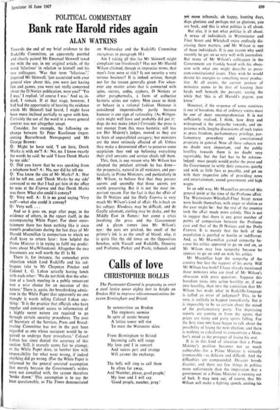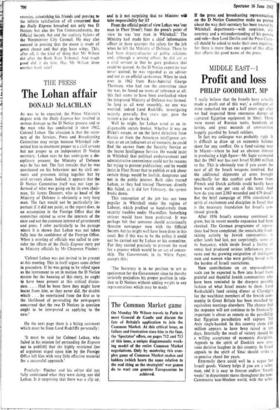Bank rate Harold rides again
POLITICAL COMMENTARY ALAN WATKINS
Towards the end of my brief evidence to the Radcliffe Committee, an apparently puzzled and clearly pained Mr Emanuel Shinwell taxed me with the use, in my original article, of the word 'hilarious' in relation to himself and his two colleagues. 'Was that term "hilarious",' inquired Mr Shinwell, 'just associated with your general view about this, you were just having fun and games, you were not really concerned about the D Notice publication, were you?' Yes I was,' I replied, 'of course I was.' And so, in- deed, I remain. If at that stage, however, I had had the opportunity of hearing the evidence which Mr Shinwell had heard, I might have been more inclined partially to agree with him. Certainly the use of the word in a more general context was not altogether unapt.
Consider, for example, the following ex- change between Sir Peter Rawlinson (repre- senting Beaverbrook Newspapers) and Mr George Brown: Q: Might he have said, 'I am here, Derek Marks is with me'? A: No no. I know exaotly the words he said; he said 'I have Derek Marks by my side.'
Q: Did you know that he was speaking from a telephone box? A: No, nor did he tell me.
Q: You know the size of Mr Marks? A: Nor did he tell me, and 'Derek Marks by my side' conveyed to me that I had got him in the office he uses at the Express and that Derek Marks was there. What else could it convey?
Q: Very well. A: It is no good saying 'Very well'—what else could it convey?
Q: Very well....
And so it goes on, page after page, in the evidence of others, in the report itself, in the accompanying White Paper. For • sheer enter- tainment there has been nothing like it since tatso's productions during the last days of Mr Harold Macmillan (a comparison to which we shall have to return later: how helpful the Prime Minister is in trying to fulfil my predic- tions about MacWilsonism). Altogether the two documents are well worth the £1 Is 9d.
There is, for instance, the somewhat prim objection which Lord Radcliffe and his col- leagues take to Mr Chapman Pincher and Colonel L. G. Lohan actually having lunch with each other: 'We do not think that the selec- tion of a lunch meeting in a public restaurant was a wise choice for an occasion of this nature.' There is, again, the breathtaking admis- sion in the White Paper that apparently no one thought it worth telling Colonel Lohan any- thing: 'It is the practice that officials who have regular and constant access to information of a highly secret nature are required to go through certain security procedures. The post of Secretary of the Services, Press and Broad- casting Committee has not in the past been regarded as one whose occupant would be re- quired to undergo these procedures.' Colonel Lohan has since denied the accuracy of this section. Still, it scarcely seems fair to attempt, as the White Paper does, to lumber him with responsibility for what went wrong, if indeed anything did go wrong. (For the White Paper is informed by the general unstated assumption that merely because the Government's wishes were not complied with, the system therefore 'broke down.' This assumption is to say the least questionable, as The Times demonstrated
on Wednesday and the Radcliffe Committee recognises in paragraph 10.) Am I taking all this (as Mr Shinwell might complain) too frivolously? Has not Mr Harold Wilson claimed, though in imprecise terms, that men's lives were at risk? Is not security a very serious business? It is indeed serious, though not for the reason generally given. For when- ever any matter arises that is connected with spies, secrets, codes, cyphers, D Notices or other paraphernalia, a form of collective hysteria seizes our rulers. Men cease to think or behave in a rational fashion. Humour is considered impermissible partly because humour is one sign of rationality. (As Wittgen- stein might well have and probably did put it: dogs do not make jokes.) Certainly the press is not exempt from this mass hysteria; still less are Her Majesty's judges, moved as they are to feats of unparalleled savagery; but ministers are the most seriously affected of all. Unless they make a determined effort to preserve some scepticism they end up believing everything their civil servants and service chiefs tell them.
This, then, is one reason why Mr Wilson has adopted the petulant attitude he has done— the propensity, natural in all ministers, and par- ticularly in Prime Ministers, and particularly in Mr Wilson, to believe first that they possess secrets and secondly that those secrets are worth preserving. But it is not the most im- portant reason. For the fact is that the affair of the D Notices and the Daily Express is very much Mr Wilson's kind of affair. He is back on his subject. Rhodesia may be difficult, and de Gaulle adamant, sterling may be shaky, and the Middle East in flames: but come a crisis involving the press and the Government and a gleam comes into Mr Wilson's eye: the ears are pricked, the smell of the printer's ink is as the smell of blood; why, it is quite like the old times on the Opposition benches, with Vassal! and Radcliffe, Denning and Profumo, Parker and Poole, tribunals and yet more tribunals; oh happy, hunting days, days glorious and perhaps not so glorious, you are back, and this is what politics is all about.
But alas, it is not what politics is all about. A nexus of individuals in Westminster and Fleet Street and Whitehall enjoy endlessly dis- cussing these matters, andi Mr Wilson is one of these individuals. It is one reason why until recently he got on so very well with journalists. But many of Mr Wilson's colleagues in the Government are frankly bored with his obses- sion with what one might describe as press- cum-constitutional issues. They wish he would devote his energies to something more produc- tive. At all events, the current posture of ministers seems to be that of keeping their heads well beneath the parapet, saying the while that 'this is all Harold's pigeon, you know.'
However, if the response of some ministers is one of boredom, that of ordinary voters must be one of sheer uncomprehension. It is not sufficiently realised, I think, how deep and widespread is the antipathy towards, and im- patience with, lengthy discussions of such topics as press freedom, parliamentary privilege, par- liamentary procedure and constitutional propriety in general. Now all these subjects are no doubt very important, and the public hostility towards them is no doubt very regrettable, but the fact has to be acknow- ledged: most people would prefer the press and the Government to settle their concerns quietly and with as little fuss as possible, and get on with their respective jobs of providing news and entertainment, sound government and high wages.
In an odd way, Mr Macmillan perceived this general point at the time of the Profumo affair. The Westminster-Whitehall-Fleet Street nexus were beside themselves, with anger or elation as the case might be: but the rest of the country took the affair much more calmly. This is not to suggest that there is any great number of points of comparison between the Profumo case and that of the D Notices and the Daily Express. It is merely that the bulk of the population is puzzled or hostile or indifferent. And, as Mr Macmillan gained sympathy be- cause his critics appeared to go on and on, so Mr Wilson may lose sympathy because he appears to go on and on with his critics.
Mr Macmillan kept the sympathy of the country but lost the support of his party. Will Mr Wilson lose both? I have already mentioned those ministers who are tired of Mr Wilson's obsession with press questions. Suppose this boredom turns into active hostility or, if not into hostility, then into the conviction that Mr Wilson has made what in Radcliffe-language is called an error of judgment? This, to be sure, is unlikely to happen immediately. But it is impossible to be so certain about the mood of the parliamentary party. The depressing reports are coming in from the agents that prices are rising and party spirits falling. For the first time mrs have begun to talk about the possibility of losing the next election; and there is nothing so calculated to concentrate a Mem- ber's mind as the prospect of losing his seat.
It is in this kind of situation that a Prime Minister's position becomes not so much vulnerable—for a Prime Minister is virtually irremovable—as delicate and difficult. And the difficulties are compounded. Disaster breeds disaster; and there are few things in politics more unfortunate than the impression that a government or a Prime Minister is running out of luck. It may turn out, of course, that Mr Wilson will make a fighting speech, smiting his enemies, astonishing his friends and proving to the infinite satisfaction of all concerned that the Daily Express breathed not only two D Notices but also the Ten Commandments, the Official Secrets Act and the sanitary bylav.s of the Westminster City Council. He may also succeed in proving that the moon is made of green cheese and that pigs have wings. This, after all, is the kind of thing that Mr Wilson did after the Bank Rate Tribunal. And much good did it do him. Has Mr Wilson done another bank rate?



































 Previous page
Previous page